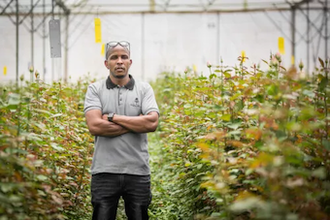Roses are dead, lovers are blue - How climate change is threatening the Valentine's Day rose

Patrick Mbugua
Valentine's Day was still celebrated by many on Ash Wednesday, but the traditional lover's gift of a rose may be under threat, according to a new report from Christian Aid which shows how climate change is impacting rose growing in Britain and around the world.
Nearly 60% (59%) of all exported roses come from five countries in the global south which face growing dangers from extreme weather. Three in East Africa: Kenya 19.1%, Ethiopia 5.1% and Uganda 1%, and two in South America: Ecuador 21.2% and Colombia 12.4%.
A new report from Christian Aid highlights that East Africa already faces erratic temperatures and extended droughts, and extreme temperatures are expected to get both hotter and more frequent - something that could make rose growing highly challenging. Roses also need plenty of water. The report cites a study which showed that droughts in the area between 2020 and 2022 were found to have been more than 100 times more likely and more severe because of climate change.
Similar climactic dangers threaten the rose growing regions of South America. In Ecuador and Colombia, roses tend to be grown in high-altitude Paramo ecosystems, with cooler temperatures and good rainfall. As the climate changes, temperature increases are expected to be highest in the Andean regions, including the Paramo, and extreme temperatures (number of days above 35ºC) are projected to rise significantly.
Glacier retreat is also a major issue in the tropical Andes, with at least 30% of their area lost between 1990 and 2020. This risks water scarcity which poses a major threat to a water-intensive industry, like rose growing.
The English Rose is under threat too.
The British love of roses is well known and the UK is the 4th largest importer of roses in the world. However climate change also poses a threat to those grown at home. On average, rose plants in the UK now start to flower about a month earlier than would have been seen as recently as the mid-1980s, due to increased average temperatures across January to April.
Increased rainfall is also a problem because of fungal diseases such as rose black spot and powdery mildew which thrive in warmer, wetter Springs. Many popular varieties of rose have disappeared because of black spot disease. David Austin's award-winning Shropshire Lad, is already being withdrawn from sale, as they lack resilience to pests, such as aphids, and diseases which are evolving with the changing climate conditions.
The report warns that without government action to cut emissions and provide financial support to rose growers and others having to adapt to the climate crisis, millions of livelihoods will be at risk.
Horticulturists, florists and climate experts have expressed concerns at the findings in the report.
Charles Shi, Botanical Horticulturist at Kew Gardens said: "Climate change has significant impacts on rose cultivation around the world. The effects of rising temperatures, changing precipitation patterns, and increased pest and disease pressure can lead to heat stress, reduced flower quality, disrupted flowering seasons, and damage to rose plants.
"Here at the Royal Botanic Gardens, Kew, horticulturists and scientists are working to collect and analyse scents from species roses. This research project will allow us to examine pollinator types associated with these species, and map the change in pollinator populations from different habitats, associated with varying wild rose numbers.
"Research such as this, along with directly addressing climate change where possible, can play a part in preserving suitable regions for rose cultivation, protecting biodiversity and pollinators, promoting sustainable practices in rose production, and safeguarding the economic benefits associated with the industry."
Osai Ojigho, Director of Policy and Public Campaigns at Christian Aid, said: "Roses are a special part of the Valentine's Day tradition but with many of them grown in parts of the world vulnerable to climate change, their future is far from rosy. These blooms bring joy, and are a vital income for growers in the global south, yet these livelihoods are endangered by the rising carbon emissions and the seemingly endless pursuit of fossil fuels from rich nations like the UK. We need to see far more urgent action from governments to invest in renewables and also commit the needed climate finance to help farmers adapt to a climate crisis they did almost nothing to cause."
Patrick Mbugua, General Manager, Wildfire Flowers, Kenya said: "I am very concerned about the impact of climate change on rose growing in Kenya. We've seen increased disease pressure due to unusual weather patterns, sometimes we have excessive hot weather which sees a jump in the number of pests, and other times unusually low temperatures which increases fungal infections, reducing yields. Another example is availability of water for irrigation. While this has not yet affected us since our source of water from Lake Naivasha has been very stable the last 10 years, it is a concern that with climate change such a source could be threatened.
"It is paramount for governments to have clear policy regarding reducing emissions and developing other interventions that can help with climate change. Governments must especially safeguard local economies and social wellbeing from the impacts of emissions. It is vital that the voices of the global south are heard at the international level. The global south emits far less than the global north but we are paying a lot more in terms of the effects on the environment, poor climate and the negative impact on economic growth.
"The Kenya Flower Council has done a lot in lobbying our concerns to the government where we need interventions especially in policy or legislation. It does a lot of training to create awareness to growers and their employees on the impacts of climate change and what interventions are available. It also monitors growers environmental impact, social ethics and fair labour practices through its Floricultural Ornamental Social Sustainability certification."
Mohamed Adow, Director of Nairobi-based climate and energy think tank, Power Shift Africa, said: "This is yet another example of the future we face if governments continue to let the climate crisis wreak havoc. Roses are a major part of the Kenyan economy, with more than half a million people relying on them for their livelihoods.
"The erratic climate, the extreme temperatures and drought that harm rose cultivation, is what scientists have been warning about for years. The inaction of political leaders to reduce carbon emissions has put an important industry in jeopardy.
"Our future doesn't have to be this way, blighted by fossil fuels. Renewables are clean, affordable and can be the bedrock of the global energy system if countries invest in them at scale. That is the only way to ensure a safe and secure climate for everyone."
A spokesperson from David Austin Roses, said: "Climate change naturally poses challenges to the cultivation of many plants, including roses. As an experienced breeder of more than 60 years, our desire to cultivate roses unrivalled in both beauty and health is still deeply rooted in the business and remains unchanged. Our breeding program is such, that we continually develop resistance to pests and diseases that shifting climate conditions can favour, adopting adaptive measures such as selecting disease, heat and drought-tolerant parent varieties for hybridisation. In addition, our David Austin Roses grown for the cut flower industry are bred here in the same way and predominantly grown on the equator where no artificial heat or light is needed in their growing practices.
"We of course do not simply stand by adjusting our approach disregarding the root course; our BLOOM programme focuses on bringing everything we do for our people, our planet, the wider community, and gardeners of the future together under one umbrella. We are committed to reviewing our practices to ensure we tread more lightly on the planet. From the implementation of integrated pest management, hosting bee hives and making the conscious choice to not spray the roses in our extensive trials, to a water capture recycling system providing 90% of annual water requirements, biomass and solar panels, zero plastic packaging and more, we strive to continually make positive changes to slow down the impact of change."
Director of Sustainability at florists Bloom & Wild Group, Sibbe Krol said: "Climate change can impact flower growing because of changes in temperature and rainfall patterns, which force the industry to both adapt and seek ways to operate sustainably.
"The flower industry needs to look to technology and innovation if it is to meet the challenge of reaching net zero. We are committed to playing our part in the transition with the up and coming launch of bouquets designed and sourced to a carbon budget and the ongoing piloting of sea freight over air, which could be the game changer the industry needs to reach net zero.
"This year, we've been piloting sea freight for some of our stems grown in Kenya, including roses. We've seen great early results in terms of quality, and this new method of transport reduces the footprint of those flowers by another 90%. And that's on top of a 75% lower footprint from flying in flowers from warmer climates rather than growing in a heated greenhouse in Europe.
"Our Kenyan growers capture and harvest rainwater, and feed it back into the growing operations using hydroponic drip technology. So no water is wasted - it's constantly recycled back into the system."
Michael Gidney, CEO of the Fairtrade Foundation said: "Fairtrade's standards require farms to optimise water use, limit pesticides and use sustainable techniques to reduce carbon footprints. We want to see fairer, more sustainable and more resilient flower supply chains in Kenya and across east Africa. For this to happen, the flower sector needs to address the challenges facing flower workers, who are exposed to low prices and are at the sharp end of the climate crisis.
"Fairtrade Foundation and our partners call on the flower industry to take collective action to agree and implement actions that will help flower farms adapt to a changing climate. This should include longer-term sourcing agreements to reduce the commercial risks for flower farms and allow them to invest in low-carbon production, and to enable workers to secure more predictable livelihoods."
Director of Sustainability at florists Bloom & Wild Group, Sibbe Krol said: "Climate change can impact flower growing because of changes in temperature and rainfall patterns, which force the industry to both adapt and seek ways to operate sustainably.
"The flower industry needs to look to technology and innovation if it is to meet the challenge of reaching net zero. We are committed to playing our part in the transition with the up and coming launch of bouquets designed and sourced to a carbon budget and the ongoing piloting of sea freight over air, which could be the game changer the industry needs to reach net zero.
"This year, we've been piloting sea freight for some of our stems grown in Kenya, including roses. We've seen great early results in terms of quality, and this new method of transport reduces the footprint of those flowers by another 90%. And that's on top of a 75% lower footprint from flying in flowers from warmer climates rather than growing in a heated greenhouse in Europe.
"Our Kenyan growers capture and harvest rainwater, and feed it back into the growing operations using hydroponic drip technology. So no water is wasted - it's constantly recycled back into the system."


















